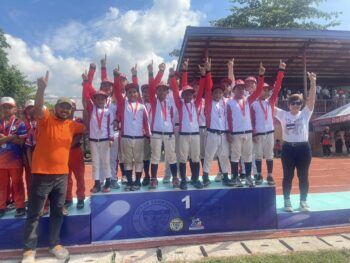
MELBOURNE, Australia (MindaNews / 28 March)—Multiple actors are now contributing towards reclaiming our historical sobriquet, “Pearl of the Orient Seas.” For instance, several civil society organizations (CSOs)—Oceana Philippines and Blue Alliance Philippines, just to name a few—have been actively raising awareness about serious maritime concerns as well as offering capacity-building trainings to address them.
More importantly, several maritime-related policy initiatives were launched under the government of President Ferdinand Marcos Jr. For example, the National Security Policy (NSP) 2023-2028 mandates the national security vision of his administration as “a free, resilient, peaceful, and prosperous archipelagic and maritime nation, at peace with itself and its neighbors, enabled and protected by reliable defense and public safety systems.”
In line with this policy, the Department of National Defense has adopted the Comprehensive Archipelagic Defense Concept to underpin the country’s national defense strategy. Moreover, President Marcos just recently approved a 10-year Maritime Industry Development Plan 2028, which will serve as the national roadmap to develop the maritime industry.
Pertinently, the Department of Science and Technology launched Pagtanaw 2050, which introduces the concept of “Blue Economy.” This strategy document defines the latter as “an overarching operational area that highlights the Philippines’ inherently archipelagic nature and resources, pointing towards the sustainable use of marine resources—living and non-living—for the improvement of people’s livelihoods while preserving the overall health of our marine ecosystems.”
Congress too has been doing its part to revive the identity of the Philippines as a coastal state, albeit in a particularly grindingly slow pace. Last month, the Senate unanimously approved in a plenary session Senate Bill No. 2492 or the Philippine Maritime Zones Act. This development comes after the House of Representatives approved their version of the bill (House Bill No. 7819) last year. When this bill becomes law it is expected “to serve as a cornerstone of the country’s maritime policy, protect sovereignty, promote sustainable development, and secure future prosperity.”
The law aims to provide a clear delineation of the Philippine maritime boundaries. With a statutory framework providing guidance, the expectation is that pertinent government institutions will perform their mandates more effectively, especially as it relates to the protection of the marine ecology within and surrounding the Philippine archipelago.
Notably, the Maritime Zones bill is just one of several pieces of legislation that are urgently needed to reclaim the maritime heritage of the Philippines. Other bills such as the Blue Economy bill and the Archipelagic Sea Lanes bill, to name a few, are still languishing in the legislative pipeline despite the clamor from many CSOs for their prompt enactment.
These laws are necessary to achieve the goal of resurrecting the country’s strong maritime standing in the region. They are needed to deepen the understanding of the country’s marine ecology (domain awareness), to entrench conservation as the underpinning principle of its utilization (blue economy), and for protecting it against those who will do harm (maritime security).
Our lawmakers must always remember that statutes are to be written with the goal of enabling the public to adhere to its commands. Hence, there should be as little vagueness and ambiguity as possible in law drafting. A poorly crafted law can undermine both government enforcement and public compliance. Keep in mind that such “gray areas” within the law usually give rise to graft and corruption.
It is must be highlighted as well that optimal implementation of the law also requires robust stakeholder engagement in the enactment process. Public consultations are necessary. But there should also be a conscious push to build a constituency behind these laws. Thus, it must be palpable in the statute itself that its drafting was informed by insights from the very actors that will be governed by it.
Legislators must never forget that the participation of relevant sectors in the crafting of the law assures community buy-in, which is vital for its objectives to be met. The absence of said community buy-in can lead to the enactment of a statute destined to become a dead letter law.
Congress bears the enormous responsibility of harmonizing and strengthening maritime governance in the country, and ultimately optimizing the potential of its marine environment for millions of Filipinos. Inaction from lawmakers means the country continues to be a maritime laggard in the region. It means to be burdened still by an inferior maritime defense capability against nations traversing our seas with malicious intent. And worst of all, it means profound intergenerational food insecurity for the Philippines.
(MindaViews is the opinion section of MindaNews. Michael Henry Yusingco, LL.M is a law lecturer, policy analyst and constitutionalist.)






